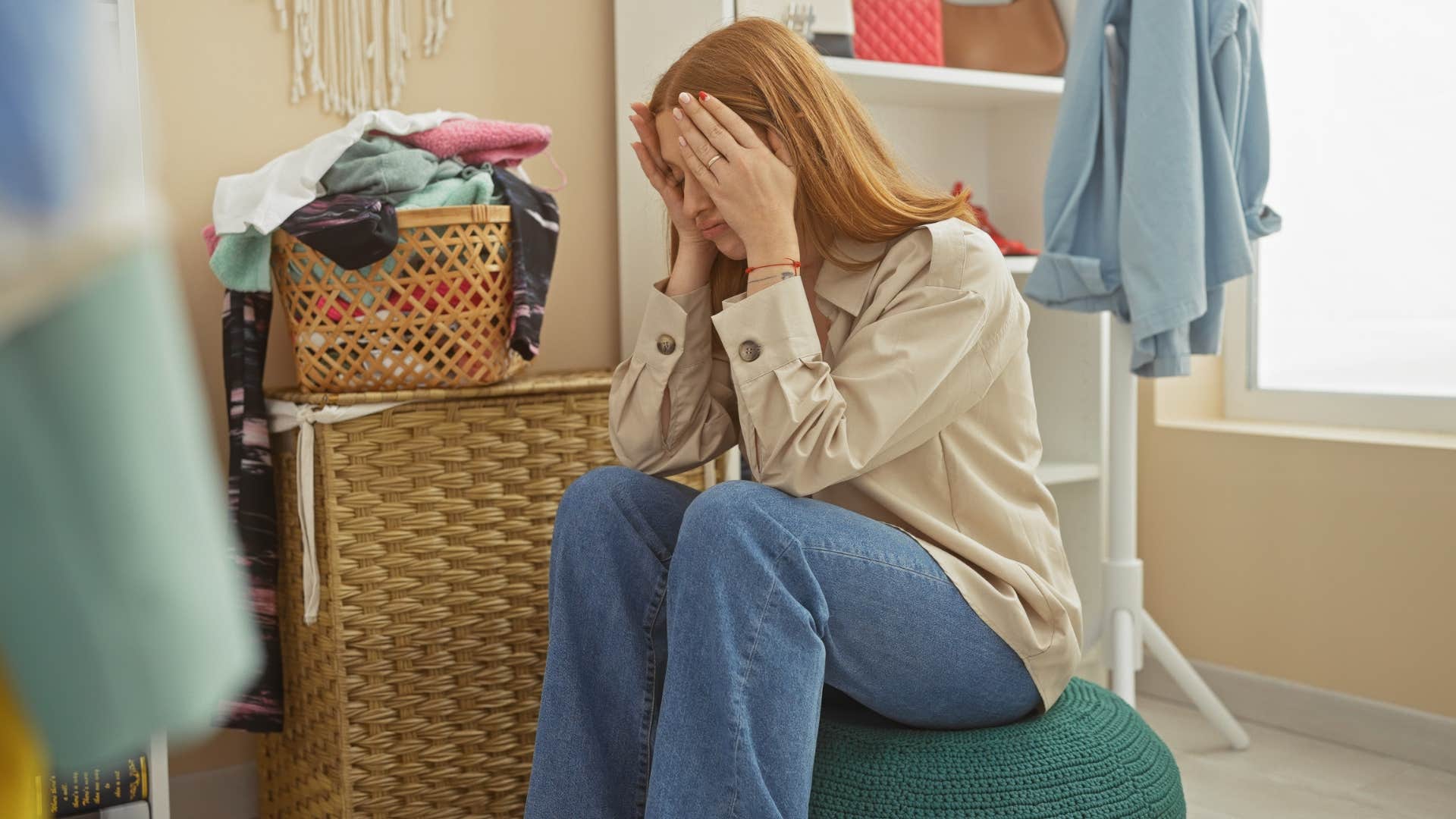11 Things People Who Grew Up In Messy Homes Can't Stand In Adulthood
People who grew up in messy homes can't stand the chaos and lack of structure.
 Prostock-studio / Shutterstock
Prostock-studio / Shutterstock Growing up in a messy home can leave a lasting impression on a person's attitudes and habits well into adulthood. Clutter, disorganization, or even loud environments can shape how much people tolerate later in life. For many who experienced these kinds of environments, everyday messes or behaviors that others might overlook become sources of real frustration.
The experience of living amidst constant disorder can create a heightened sensitivity to untidiness, a strong desire for control, and structure in their adult lives. As a result, adults who grew up in messy homes often have specific pet peeves and boundaries around cleanliness that can seem extreme to others. These common dislikes show how childhood environments can shape adult perspectives and behaviors.
Here are 11 things people who grew up in messy homes can't stand in adulthood
1. Cluttered space
 Nicoleta Ionescu | Shutterstock
Nicoleta Ionescu | Shutterstock
Growing up in a messy home can have you living in constant chaos and disorder that will eventually affect you well into adulthood. For many, cluttered spaces trigger feelings of anxiety because they associate messiness with a lack of control and stability during childhood. As adults, they crave a sense of order to feel calm.
Clutter can serve as a reminder of neglect or unresolved family tensions, so keeping their own space tidy becomes a way to create a fresh start. Around 48% of American homeowners say clutter impacts their mental health. For them, cleanliness helps them think clearly and maintain efficiency without distractions. They crave order to feel calm and grounded, making clutter something they actively avoid.
2. A lack of routine
 Pheelings media | Shutterstock
Pheelings media | Shutterstock
For those raised in chaotic or messy households, a lack of routine in adulthood can be deeply unsettling. Every day of childhood feels unpredictable, and it becomes difficult to feel secure without a definitive structure. They want routine as a way to soothe the pains from childhood and gain control where they felt they had none.
Children who are exposed to frequent family transitions or disrupted routines tend to experience less stability in their own romantic partnerships as young adults. They may put their trust in people who rarely show up for them. This brings their self-worth down and causes them to put their own needs on the back burner.
3. Unreliable roommates or partners
 New Africa | Shutterstock
New Africa | Shutterstock
A lack of routine growing up can cause people to pick unreliable friends and partners. It can turn them into people pleasers who do everything for everyone but never get anything in return, or worse, are ignored. For instance, when a roommate forgets to pay their portion of the bills or leaves the dishes for them to clean, it can feel like being back in the instability that was their childhood.
Unreliable people trigger old memories of struggle and disappointment. After years of navigating inconsistency in their formative years, many of these adults have little tolerance for feeling like they're the only ones holding things together again. That's why dependability becomes a non-negotiable trait in relationships for them.
4. Unexpected guests
 StoryTime Studio | Shutterstock
StoryTime Studio | Shutterstock
In childhood, surprise visits meant a scramble to hide the mess or clean rapidly to make guests feel more comfortable. That lingering stress never truly goes away, the older we get. When we know guests are coming over, we rush to get our homes clean and mentally prepare to clean more after they leave.
For people who grew up in messy homes as children, unexpected guests can feel like a violation of a peaceful environment. Their home may now be spotless and orderly, but when someone drops by unannounced, it can make them feel like things are receding back to unpredictable times. Even a close friend's visit with their children can stir up unease.
5. Hoarding
 Olena Yakobchuk | Shutterstock
Olena Yakobchuk | Shutterstock
Hoarding is a common thing for people to have, but having it to the point where you can barely move around your house is insanity. Children from hoarding families may have felt overwhelmed, anxious, or even unsafe in environments where objects piled up. Adults who were raised in cluttered homes reported lower psychosocial functioning, including anxiety, depression, and diminished emotional support.
These emotional stressors can drive anyone crazy, especially when they're hyper-aware of their surroundings, like the child of a hoarder was raised. They constantly had to worry about stepping on things that they shouldn't or risk having something fall on them on the way out of the door. Hoarding, to them, isn't just a messy habit, but it’s also a reminder of everything they've worked hard to leave behind.
6. Unclean bathrooms or kitchens
 Andrey_Popov | Shutterstock
Andrey_Popov | Shutterstock
Those who grew up in chronically messy homes often had unclean bathrooms and messy kitchens. The two spaces that were supposed to be kept the most hygienic were a cesspool of spills and clutter. As adults, they keep their bathrooms and kitchens as clean as possible.
A dirty kitchen reminds them of the instability that they grew up with. Sticky countertops and dishes in a sink can cause discomfort. In their own homes, this wouldn't stand. They learned from their parents' mistakes and always keep their private space tidy to avoid that feeling they get.
7. A disrespect of boundaries
 BongkarnGraphic | Shutterstock
BongkarnGraphic | Shutterstock
Growing up, their personal space was constantly invaded by their parents or siblings. As grown adults, they seek solitude and can set strict boundaries with others. Some may think these boundaries are too strict, but one look at their childhoods will make others understand why.
People who overstep their boundaries or push too quickly to be near them will be met with a cold shoulder. This is because they are trying their best to protect the one thing that they valued when they were young, which is privacy. This sensitivity is just a form of self-protection.
8. Loud environments
 fizkes | Shutterstock
fizkes | Shutterstock
A messy home can come in many forms that involve more than just a mess. Messy homes often lead to chaos, characterized by loud noises and disorder, which in turn causes the messes. Two siblings fighting on a couch can cause extreme chaos, especially when they start fighting using objects or toys to make a mess.
Silence or soft background sound shows a sense of control and comfort around the household. Noise sensitivity is strongly correlated with behavioral problems like anxiety, hyperactivity, and emotional issues in youth. While others might enjoy the buzz of activity, those with chaotic home upbringings wish they had silence and stillness.
9. Disorganization
 Krakenimages.com | Shutterstock
Krakenimages.com | Shutterstock
Disorganization is the biggest pet peeve that people who grew up with messy homes have. Growing up with household disorganization leads to poor self-regulation, behavioral problems, and lower academic skills in children. Having misplaced items or too many in one area can cause young children distress.
Clutter can become symbolic of neglect or household dysfunction. This is why, as adults, they may develop an obsession with minimalism that keeps them organized. For someone shaped by a disordered childhood, keeping things in place isn't just a preference, it's survival.
10. Unmade beds
 Pixel-Shot | Shutterstock
Pixel-Shot | Shutterstock
Beds are more than just places where you lie your head at night to sleep. They're a representation of where your mental health is at. If you make your bed every morning, then chances are you are more stable than someone who just lazily lets it be messy. Growing up in a household that was messy meant no one had any expectations that you were going to make your own bed because they never made theirs either.
Making the bed can be a form of self-care, especially for those who never experienced that kind of attention growing up. When you skip out on doing this, you will notice a shift in attitude as old wounds fester up about a home being messy during your childhood. While some might not think it's a big deal, an unmade bed could make or break your mood when you see it.
11. Lingering smells
 F01 PHOTO | Shutterstock
F01 PHOTO | Shutterstock
For many people who grew up in messy homes as children, lingering smells trigger a deep discomfort. Scents like old food, mildew, or stale air can bring back memories of cluttered rooms and poor hygiene. The odors remind them of the neglect and the embarrassment that they once felt as children.
This sensitivity also extends to others' homes or public spaces. They might judge a room with musty air or a fridge that smells off because they associate it with the lack of care from their childhoods. For them, a clean scent represents a life that's in order, far from the chaos they once knew.
Sylvia Ojeda is an author who has over a decade of experience writing novels and screenplays. She covers self-help, relationships, culture, and human interest topics.

